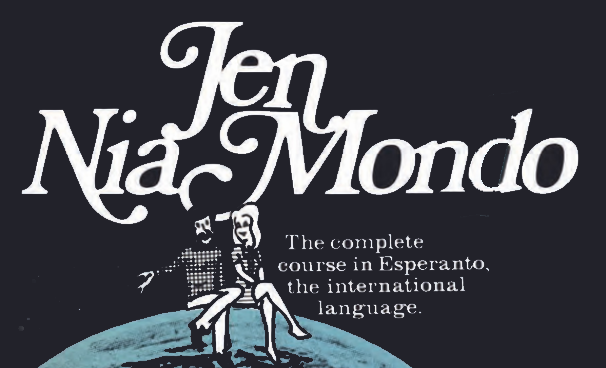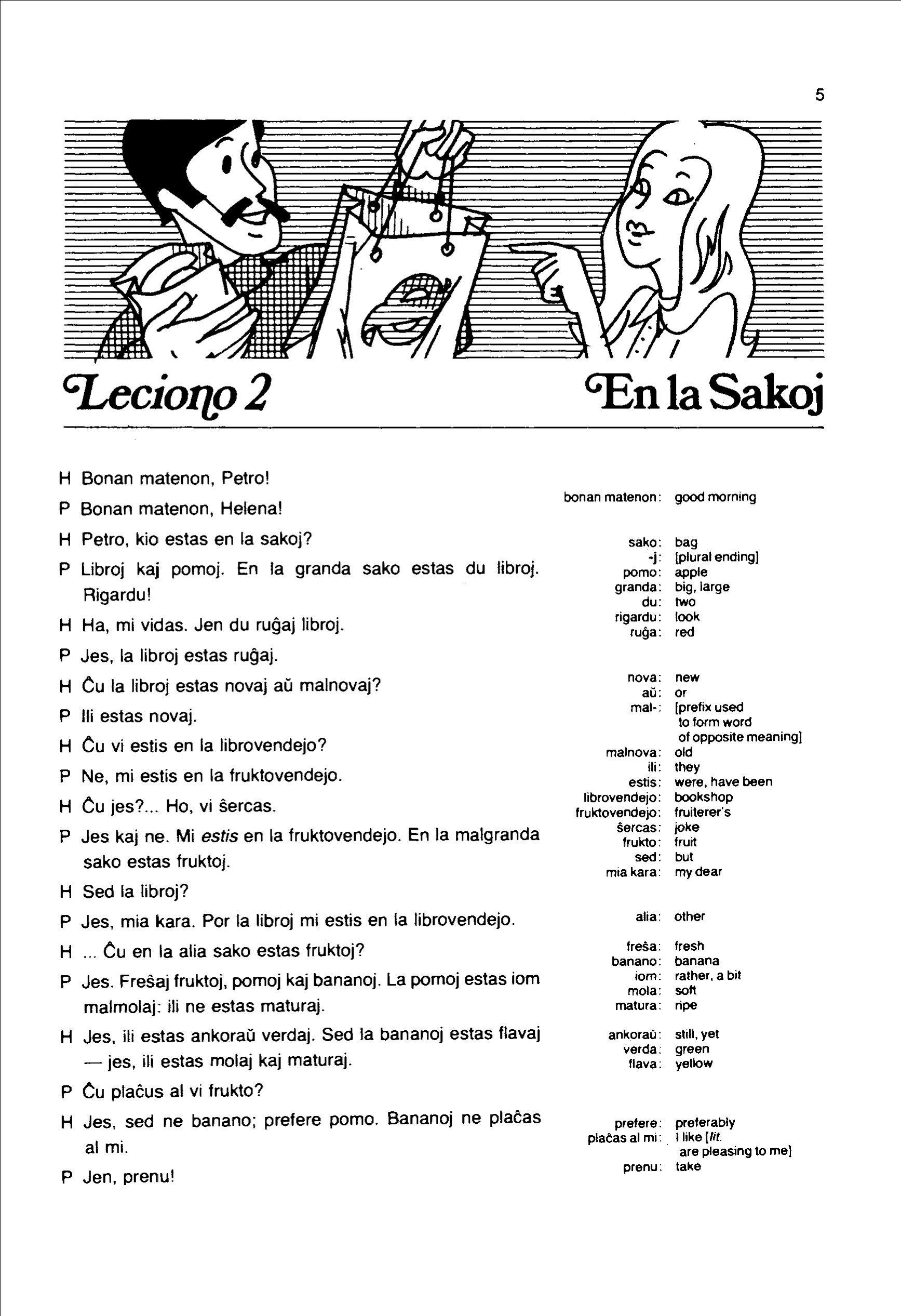
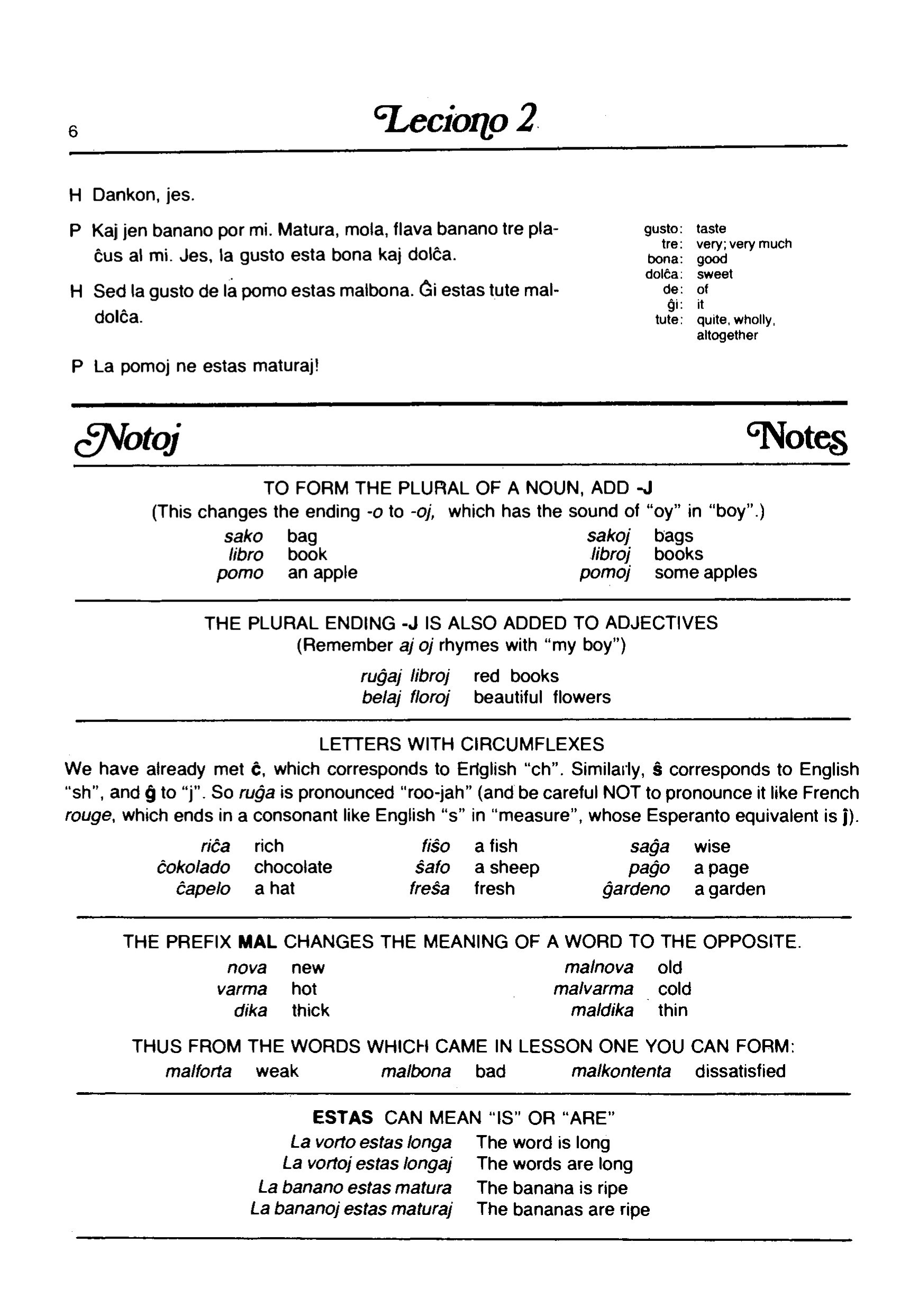
Reducing burdens and risks
This lesson underlines two important objectives of Esperanto – firstly to reduce the burden of learning vocabulary and secondly to avoid the risk of being misunderstood. ‘Mal’ is just the first of forty or so ‘affixes’ used to avoid creating totally new words. Adding ‘extra bits’ to existing words enables the re-use of familiar material. It reduces the burden of learning and can improve clarity. Ambiguity is avoided when adjectives are required to take plural endings alongside the nouns they accompany in all circumstances. An automatic practice is ‘safer’ than having to take care might there be ambiguity. It also increases sonority in the language.
In following these two practices Esperanto extends to their logical conclusion practices partially followed in many languages.
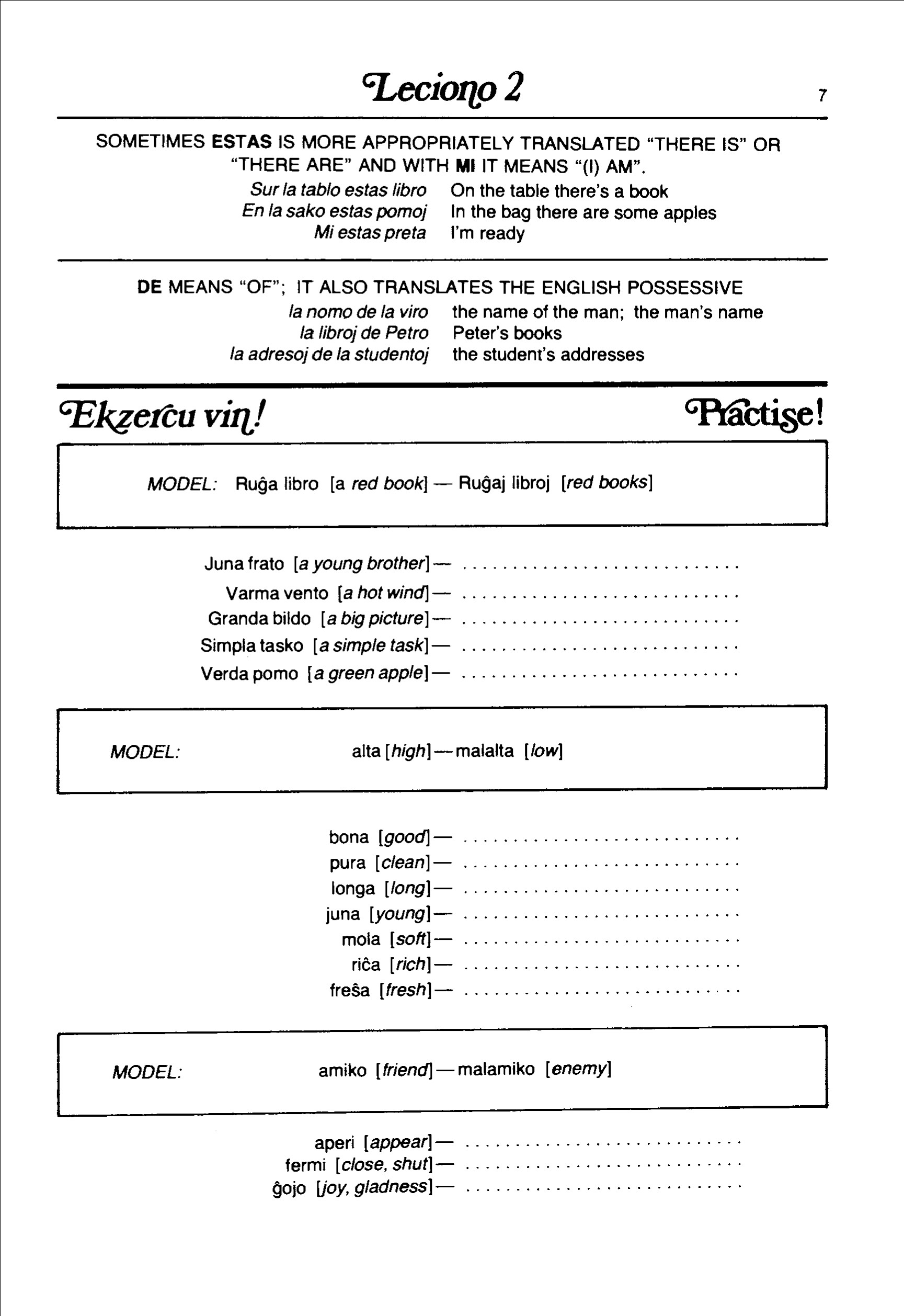
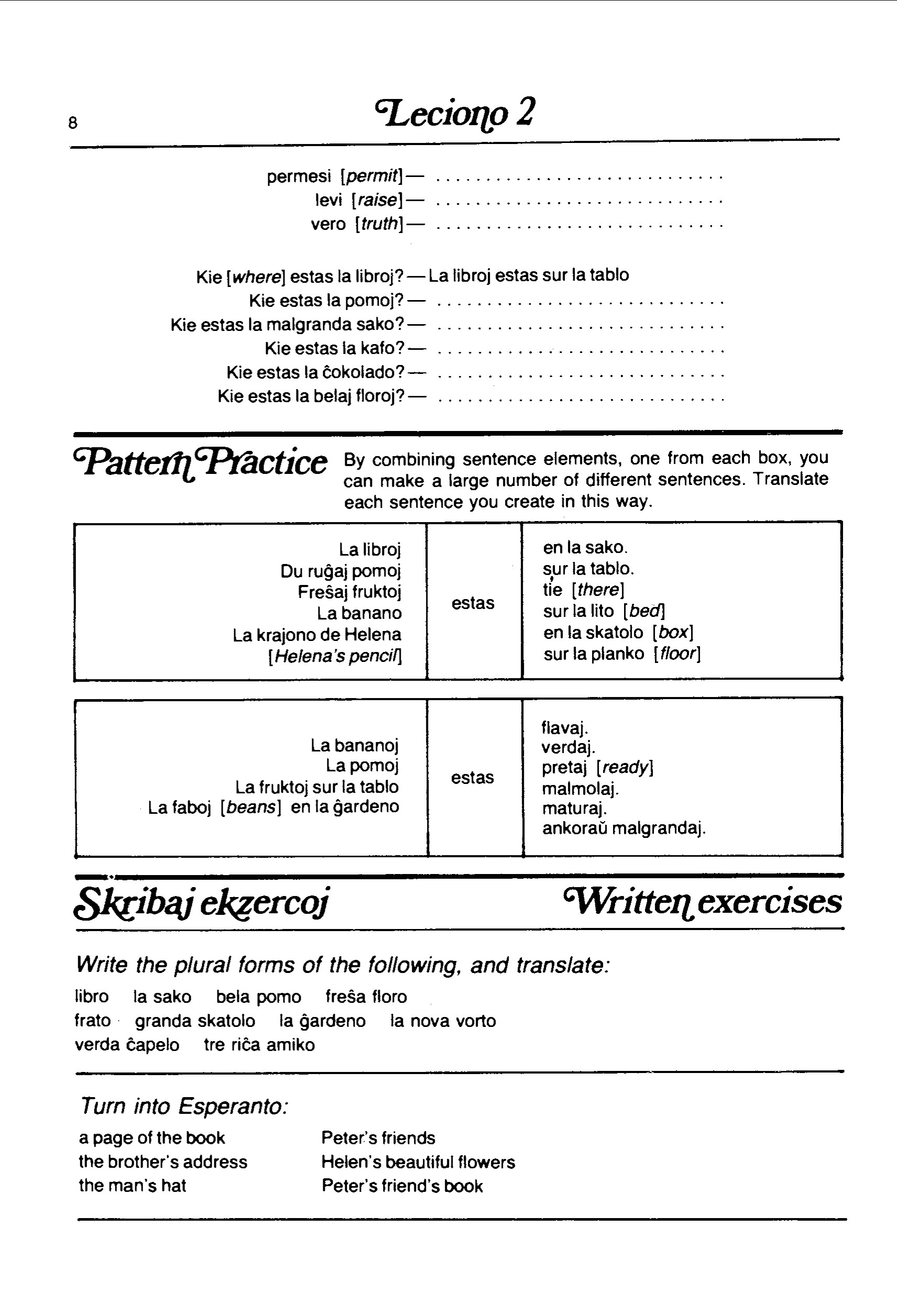
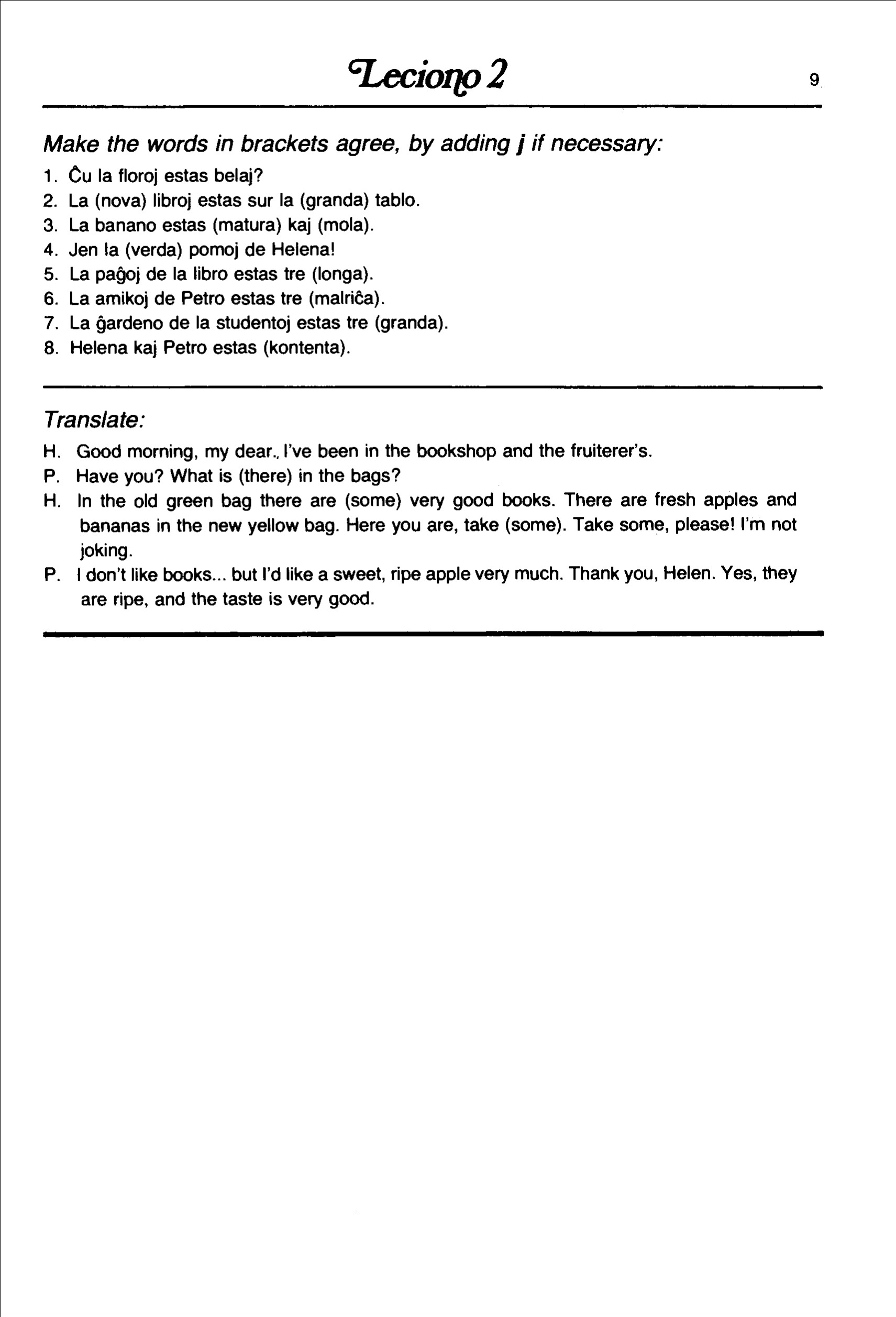

Sample answers are offered below
Did you write out ‘answers’ for Lesson 1? Add your new ones to them now. Has writing things out paid any dividends? Writing is another medium besides listening and talking. It is also visual. You see what you have written, which will help retention later. Note how using the plural ending ‘j’ for both adjective and noun in a phrase like ‘junaj fratoj’ is relatively easy to remember and practise. While it improves clarity and sonority, it also contributes much to the distinctive sound of the language. Some compare it to ancient Greek, a very successful language in its day!
Please attempt the exercises before consulting the material below.
Leciono 2 Example Answers / Ekzemplaj Solvoj
Page 7
Ekzercu vin!
Juna frato [a young brother] – Junaj fratoj [young brothers]
Varma vento [a hot wind] – Varmaj ventoj [hot winds]
Granda bildo [a big picture] – Grandaj bildoj [big pictures]
Simpla tasko [a simpla tasko] – Simplaj taskoj [simplaj taskoj]
Verda pomo [a green apple] – Verdaj pomoj [green apples]
bona [good] – malbona [bad]
pura [clean] – malpura [dirty]
longa [long] – mallonga [short]
mola [soft] – malmola [hard]
riĉa [rich] – malriĉa [poor]
freŝa [fresh] – malfreŝa [stale]
- Note! an Esperanto word always receives a clear stress on its penultimate (one-before-the last) vowel / syllable. So say ‘BO-na, mal-BO-na’; ‘ri-ĉa , mal-RI-ĉa’
aperi [appear] – malaperi [disappear] –
fermi [close] – malfermi [shut]
ĝojo [joy, gladness] – malĝojo [sadness, sorrow]
Page 8
permesi [permit] – malpermesi [forbid]
levi [raise] – mallevi [lower]
vero [truth] – malvero [falsehood, lie]]
Kie [where] estas la pomoj? La pomoj estas en la fruktovendejo / la ĝardeno
Kie estas la malgranda sako? La malgranda sako estas en la fruktovendejo
Kie estas la kafo? La kafo estas en la taso / sur la tablo
Kie estas la ĉokolado? La ĉokolado estas sur la tablo
Kie estas la belaj floroj? La belaj floroj estas en la ĝardeno
Pattern Practice – Possible Answers
La libroj estas en la skatolo – The books are in the box
Du ruĝaj pomoj estas en la sako – Two red apples are in the bag
Freŝaj fruktoj estas sur la planko – Fresh fruit are on the floor!
La banano estas sur la tablo – The banana is on the table
La krajono de Helena estas tie sur la lito – Helen’s pencil is there on the bed.
La bananoj estas maturaj – the bananas are ripe
La pomoj estas ankoraŭ malgrandaj – The apples are still small
La fruktoj sur la tablo estas flavaj – The fruit on the table are yellow.
La faboj en la ĝardeno estas pretaj – The beans in the garden are ready.
Skribaj Ekzercoj / Written exercises
libro > libroj : a book > books
la sako > la sakoj : the bag > the bags
bela pomo > belaj pomoj : a beautiful apple > beautiful apples
fresa floro > freŝaj floroj : a fresh flower > fresh flowers
frato > fratoj : a brother > brothers
granda skatolo > grandaj skatoloj : a big box > big boxes
la ĝardeno > la ĝardenoj : the garden > the gardens
la nova vento > la novaj ventoj : the new wind > the new winds
verda ĉapelo > verdaj ĉapeloj : a green hat > green hats
tre riĉa amiko > tre riĉaj amikoj : a very rich friend > very rich friends
Turn into Esperanto
a page of the book > paĝo de la libro
the brother’s address > la adreso de la frato
the man’s hat > la ĉapelo de la viro
Peter’s friends > Amikoj de Petro
Helen’s beautiful flowers > la belaj floroj de Helena
Peter’s friend’s book > la libro de amiko de Petro
Add ‘j’ if necessary
Ĉu la floroj estas [beautiful] belaj?
La novaj libroj estas sur la granda tablo
La banano estas matura kaj mola
Jen la verdaj pomoj de Helena!
La paĝoj de la libro estas tre longaj
La amikoj de Petro estas tre malriĉaj
La ĝardeno de la studentoj estas tre granda
Helena kaj Petro estas kontentaj
Translate / Traduki
H. Good morning my dear. I’ve been in the bookshop and the fruiterer’s
Bonan matenon, mia kara. Mi estis en la librovendejo kaj la fruktovendejo.
P. Have you? What is (there) in the bags?
Ĉu vi (estis)? Kio estas en la sakoj?
H. In the old green bag there are (some) very good books. There are fresh apples and bananas in the new yellow bag. Here you are, take (some). Take some, please! I’m not joking.
En la maljuna verda sako estas tre bonaj libroj. Estas freŝaj pomoj kaj bananoj en la flava sako. Jen, prenu. Prenu, mi petas. Mi ne ŝercas.
P. I don’t like books . . . but I’d like a sweet, ripe apple very much. Thank you, Helen. Yes, they are ripe, and the taste is very good.
Ne plaĉas al mi libroj … sed tre plaĉus al mi dolĉa matura pomo. Dankon, Helena. Jes, ili estas maturaj kaj la gusto estas tre bona.
Footnote
1. ‘Estas‘ covers English’s ‘am‘, ‘is‘ and ‘are‘. Similarly ‘estis‘ covers English ‘was‘ and ‘were‘. ‘have been‘ and ‘has been‘ and possibly helped by an adverb even ‘had been‘ as you’ll see later.
2. The endings ‘i’ used for example in ‘aperi’ and ‘u’ used for example in ‘diru’, ‘rigardu’, ‘prenu’ are explained later. Similarly the ending ‘us’ used for example in ‘plaĉus’.
3. The construction ‘books are not pleasing to me‘ or even more oddly for an English speaker ‘not pleasing to me [are] books‘ is common in many languages, e.g. Irish, French, Spanish, German etc. Meeting it in Esperanto can assist learners tackle something similar in other languages, if they have not already met it.
Lesson 2 – All the words introduced above
Adres/o
Ali/a
Alt/a
Amik/o
Ankoraŭ
Aper/i
Aŭ
Banan/o
Bela
Bild/o
Ĉapel/o
Ĉokolad/o
De
Dolĉ/a
Du
Fab/o
Ferm/i
Fiŝ/o
Flav/a
Frat/o
Freŝ/a
Frukt/o
Grand/a
Gust/o
Ĝarden/o
Ĝi
Ĝoj/o
Ili
Iom
Jun/a
Kar/a
Kie
Krajon/o
Lev/i
Lit/o
Mal
Matur/a
Mol/a
Nom/o
Nov/a
Paĝ/o
Permes/i
Plaĉas
Plank/o
Pom/o
Pren/i
Pret/a
Riĉ/a
Rigard/i
Ruĝ/a
Saĝ/a
Sak/o
Sed
Simpl/a
Skatol/o
Sonor/(ig)/i
Student/o
Ŝaf/o
Ŝerc/i
Tasko
Tie
Tre
Tut/a
Vend/ejo
Vent/o
Ver/o
Verd/a
Vir/o
Vorto
Address
Other cf ally
High/tall cf altitude
Friend cf amicable
Still / yet
Appear
Or
Banana
Beautiful
Picture cf Bild Deu
Hat
Chocolate
Of, from
Sweet cf dulcid
Two cf duo
Bean
Close, shut
Fish
Yellow
Brother cf fraternal
Fresh
Fruit
Big
Taste cf gusto
Garden
It
Gladness, happiness
They
Somewhat, a bit
Young
Dear cf ‘Cara mia’ It
Where
Pencil cf crayon Fr
Lift, raise cf levitate
Bed
Direct opposite of
Ripe cf mature
Soft cf mollify
Name
New cf novel
Page
Permit
Pleases, is pleasing
Floor cf plank
Apple
Take
Ready
Rich
Look (at)
Red cf rouge
Wise cf sage
Bag cf sack
But cf sed Lat
Simple
Box
Ring cf sonorous
Student
Sheep
Joke
Tasko
There
Very cf Fr très
Whole
Store cf vendor
Wind
Truth cf verity
Green cf verdant
Man cf virile
Word cf Wort Deu
